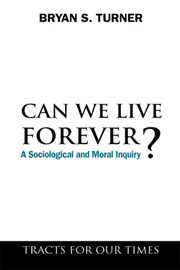Book contents
- Frontmatter
- Contents
- Acknowledgements
- Can We Live Forever?
- Chapter One Longevity and the Population Debate
- Chapter Two The Social Utopia of Human Perfection
- Chapter Three Ancient and Modern Techniques of Longevity
- Chapter Four The Political Economy of Ageing
- Chapter Five The Moral and Spiritual Character of Old Age
- Chapter Six Vulnerability and the Ethic of Care
- Chapter Seven Towards a New Paradigm of Ageing
- Chapter Eight The Aesthetics of Ageing
- Bibliography
- Index
Chapter Seven - Towards a New Paradigm of Ageing
Published online by Cambridge University Press: 05 March 2012
- Frontmatter
- Contents
- Acknowledgements
- Can We Live Forever?
- Chapter One Longevity and the Population Debate
- Chapter Two The Social Utopia of Human Perfection
- Chapter Three Ancient and Modern Techniques of Longevity
- Chapter Four The Political Economy of Ageing
- Chapter Five The Moral and Spiritual Character of Old Age
- Chapter Six Vulnerability and the Ethic of Care
- Chapter Seven Towards a New Paradigm of Ageing
- Chapter Eight The Aesthetics of Ageing
- Bibliography
- Index
Summary
Introduction: The Rights Discourse
I started this book with the debate between optimists such as Paine, Godwin and Condorcet and pessimists such as Malthus and Ricardo over the prospects for happiness and a full life, especially as it had been envisaged by Paine (1995) in his Rights of Man. While prolongevity obviously raises factual problems about the feasibility of life extension such as freezing whole bodies, it very definitely raises ethical and philosophical problems about how life extension might be justified. In this book I am claiming that there are two important frameworks for its justification. One is an aesthetic justification, which I am deriving from Nietzsche, that by making our lives into a work of art we might justify long life both to ourselves and to others. The alternative is justification in terms of rights (either human rights or the social rights of citizenship). In this rights framework, the right to long life might be developed as fundamentally an extension of a right to life as such or a right to health. Let us turn again to the question of rights.
Egalitarian concepts of social justice and human rights have been used in diverse ways in the life extension project debate. Researchers who are sympathetic to the project have both drawn upon and rejected the egalitarian approach in their argumentation. Generally speaking, they highlight the untenable position of delaying scientific progress while governments and international agencies attempt to resolve existing problems of global social inequality (Post 2004).
- Type
- Chapter
- Information
- Can We Live Forever?A Sociological and Moral Inquiry, pp. 125 - 138Publisher: Anthem PressPrint publication year: 2009



